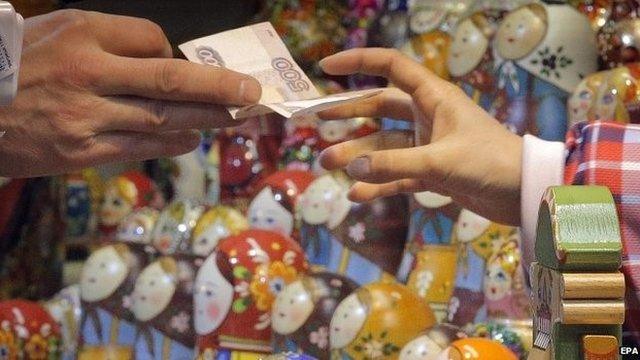Putin's news conference: Five things we learned
- Published
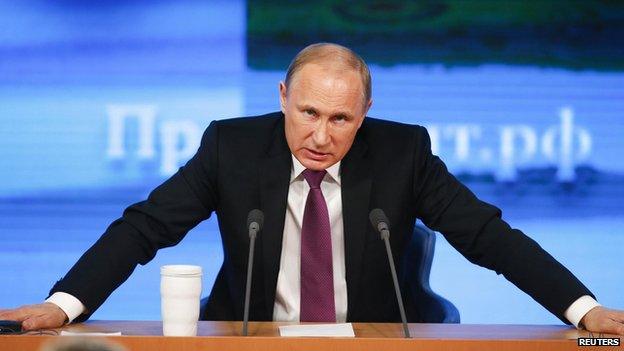
President Putin reassured Russians that they would weather the difficulties
Russian President Vladimir Putin has been speaking at his end-of-year news conference.
Over the course of three hours, he discussed the economy, Ukraine, the opposition - and his love life.
Here are five things we learnt.

Belt-tightening ahead
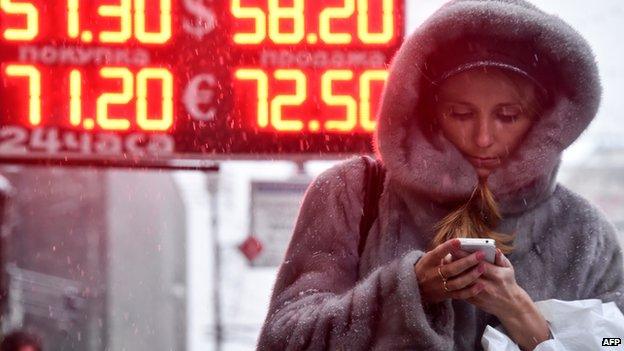
Russians are paying more for imported goods because of the plunging rouble
Judging by Mr Putin's forecast, Russians can expect the current rocky ride to continue: the collapse in oil prices and plummeting rouble are due to "external factors" which may go on for two years.
But the vulnerable will be looked after: food prices and pensions will be protected. And big spending plans to upgrade Russia's armed forces, invest in infrastructure and prepare for the 2018 World Cup in Russia will be shaved, not shelved.
Anyway, if a cheaper rouble means more expensive imports that is to be welcomed, in Mr Putin's view. He believes the only way Russia can grow stronger and safer is to rely less on foreigners and more on itself.
"Only a strong Russian state can protect the interests of Russian citizens," he said, after telling a cautionary tale of an offshore Russian company whose money was blocked because of Western sanctions.
For jittery markets, there were two concrete takeaways. First, a reassurance that it would not be right to take the drastic step of imposing planning capital controls - at least not yet.
Second, the news that a prominent Russian oligarch has been released from house arrest and may even be granted a presidential audience.
Vladimir Yevtushenkov's arrest on charges of alleged money laundering a few months ago sent shivers through Russia's business elite, who feared it might be a harbinger of more to come.

The threat from without: Bear-baiting
As usual, Mr Putin appeared to extend some olive branches, claiming he wanted to work with the West on issues of mutual concern, and insisting Russia stood ready to mediate in the Ukraine crisis.
But elsewhere there was no spirit of compromise or conciliation, or any sign of the radical change in Russia's outlook which the EU foreign policy chief has just appealed for.
On Ukraine: "We are right and you are wrong," he said, accusing the West of backing an illegal coup and explaining away the conflict in the south-east as Kiev's "punitive" onslaught on its own citizens.
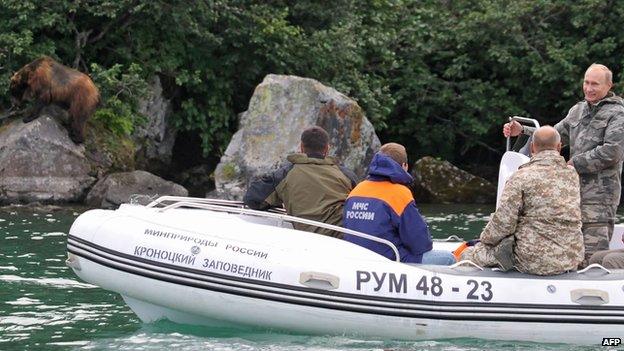
President Putin says the West is once again trying to rein in the Russian bear
And Russia's involvement? Yes, there were some volunteer soldiers, but they were "not mercenaries - they aren't being paid". Also, any trucks contained humanitarian aid.
More importantly, in the last two months Mr Putin and his top officials have begun to argue that this crisis is not really about Crimea and Ukraine at all. Really, he now says, this is an age-old campaign by hostile Western powers intent on weakening and containing a Russian foe.
Any new "walls" being erected in Europe are due to Nato's expansion, not Russian aggression. The West, he claims, has always wanted to "chain the bear" and "defang it and pull out its claws".
He even insinuated that Russia's war with Chechnya in the 1990s may have been partly fuelled - on the Chechen side - by outside help from the West.

The threat from within: Invisible traitors
As for Russia's internal politics, he was twice asked where he drew the line between a "fifth column" of traitors whom he says he will not tolerate, and a legitimate political opposition.
Mr Putin repeatedly said it was a delicate matter and a difficult line to draw - hardly reassuring for those worried about where they stand.
He added that it came down to what his critics thought. Were they Russian patriots who held their country dear, or were they acting on the orders of another government whose interests were alien to Russia's?

He doesn't know what he earns
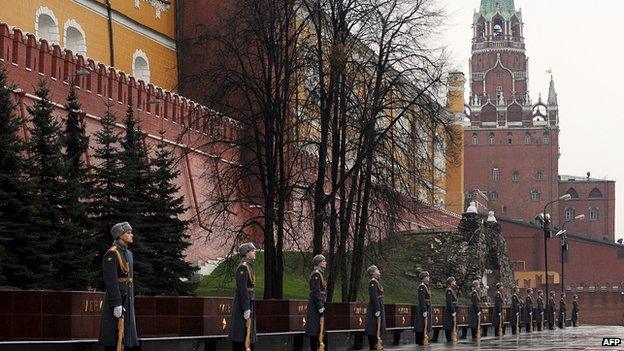
The Kremlin is well-defended, says Mr Putin
Some of the Russian questions were surprisingly sharp and challenging:
Was the economic pain Russia was enduring now the cost it had to bear for taking Crimea?
Did Mr Putin know that some in his entourage privately blamed him for Russia's problems, so was he afraid of a palace coup? The answer: "No, because we have no palaces and the Kremlin is well defended."
And was it not his own cronies, those who reaped high salaries from controlling state enterprises or the main TV channels who were really the enemies of Russia?
Mr Putin calmly replied that Igor Sechin, who runs Russia's biggest state oil company, was an efficient manager and he had no idea what he earned. As an afterthought the Russian President added that he did not know what his own salary was either.
As usual at this annual extravanganza, many regional journalists waved placards, like peasants petitioning their tsar. One woman, from a car magazine, brought along a green woolly crocodile to make her point.
Another man, with slurred speech, called for Russians to drink less foreign Coca-Cola and more domestic kvas, a Russian honey drink. Mr Putin agreed with him, and joked that the questioner had already had enough - though it later emerged he was not drunk but had suffered from a stroke.

Putin and love
Probably the Russian public will best remember the woman from Voronezh who said her aunt wanted to know if he, Russia's top bachelor, was still single. Mr Putin's reply: "Say hi to your aunt and tell her all is well."
He added that he had told another friend that he was no monster but loved someone and was loved in return - and maintained good relations with his ex-wife.
Mr Putin knows how to please the crowds. He throws in a few personal details to signal that he is as human as anyone else, and - even at this time of crisis - he is relaxed enough to enjoy banter with the audience in between the reassurances that Russia will weather its difficulties.
- Published17 December 2014
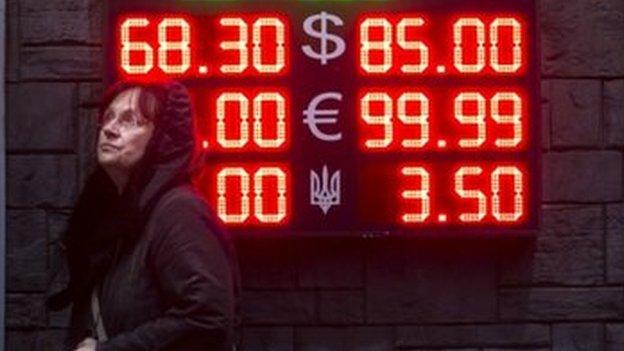
- Published16 December 2014
